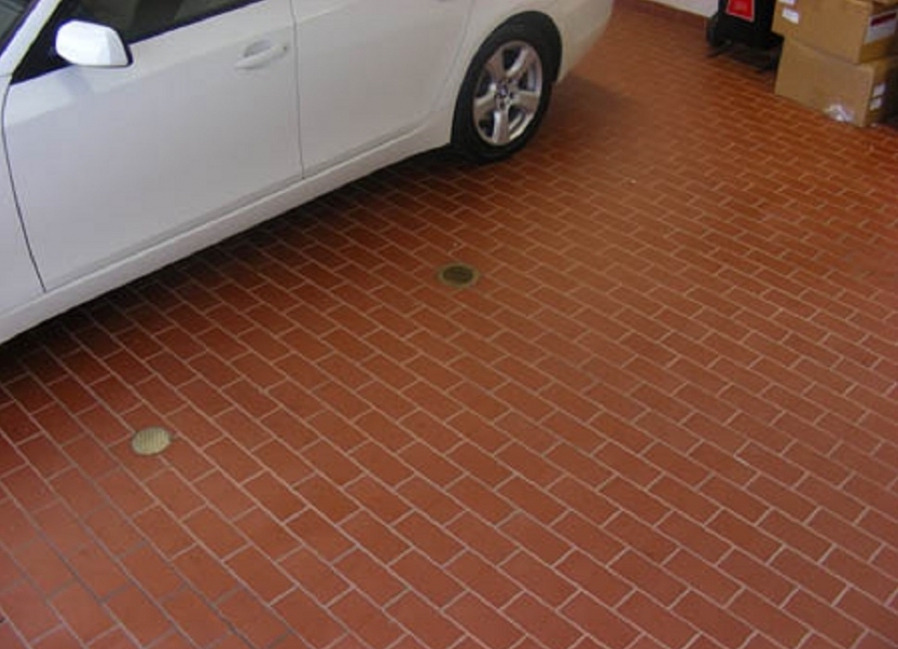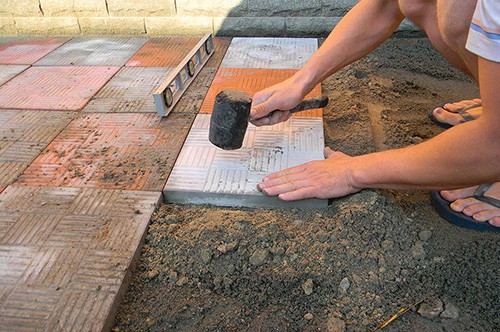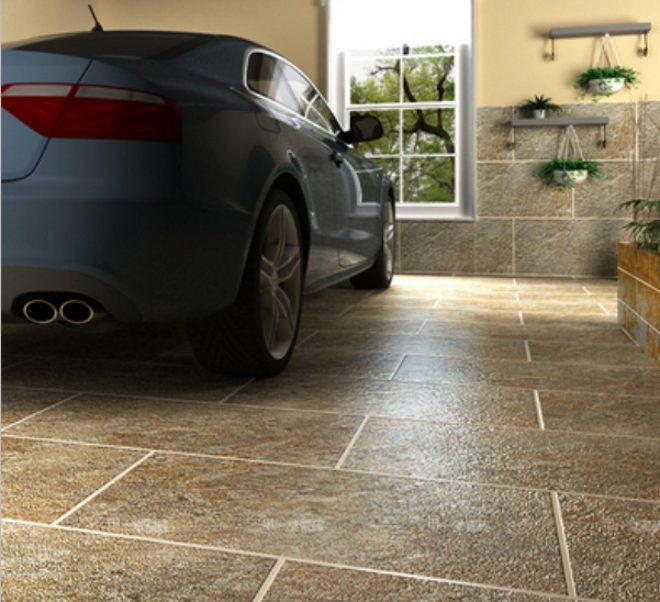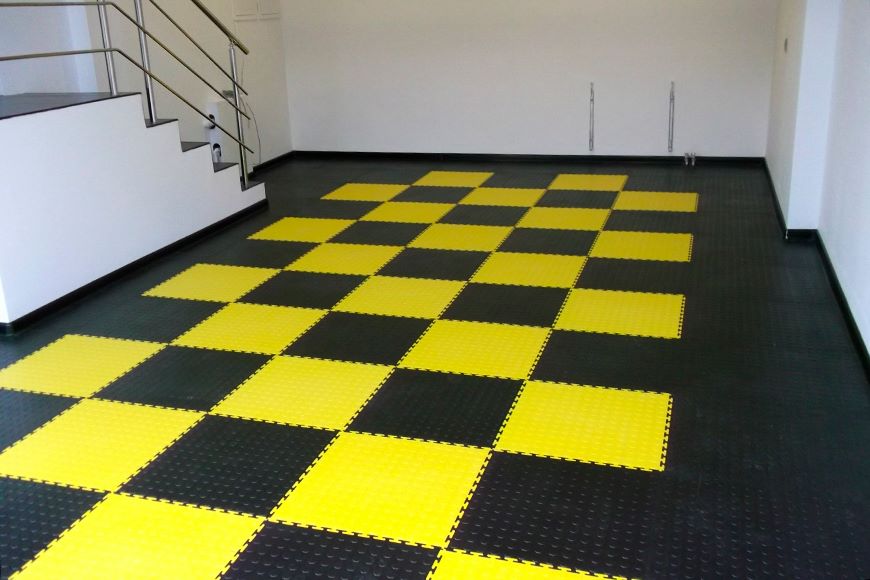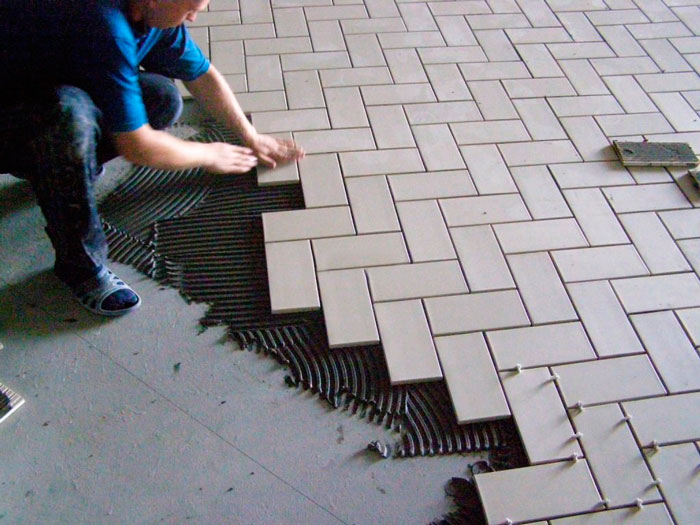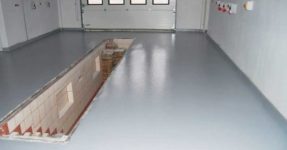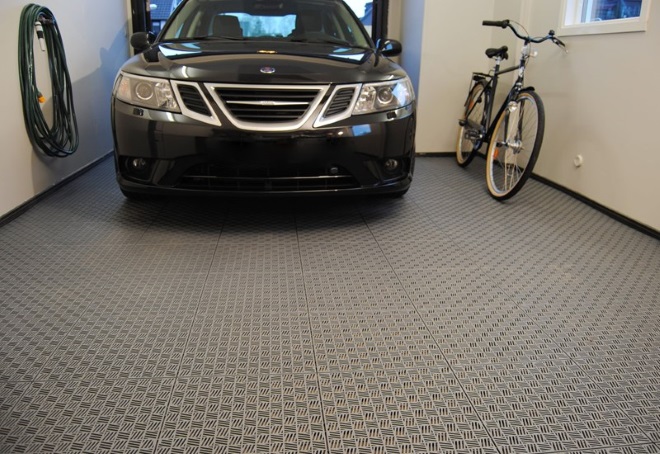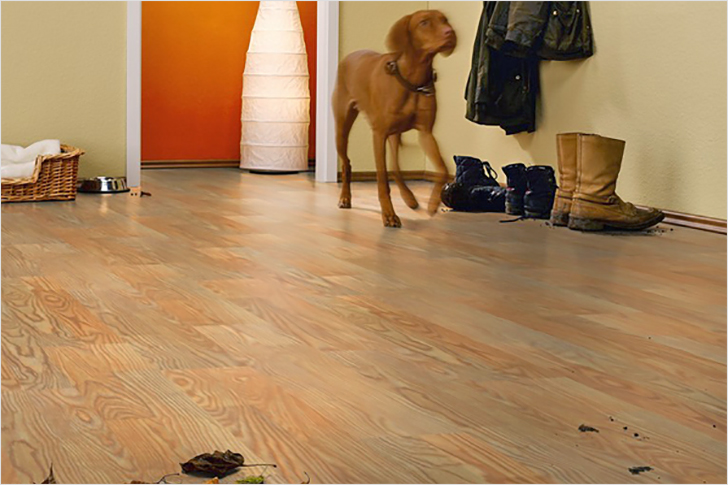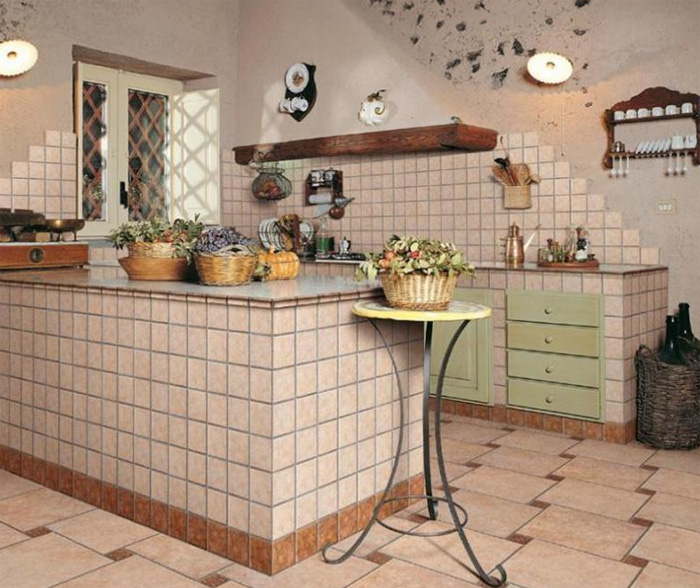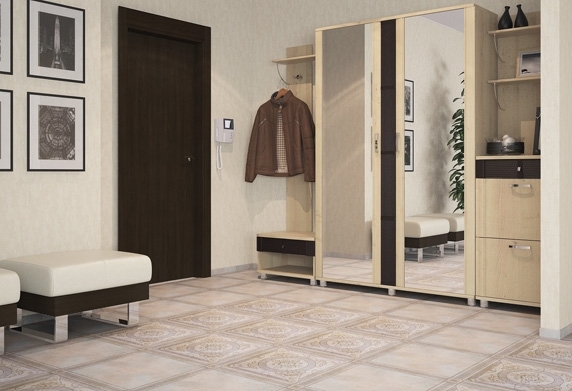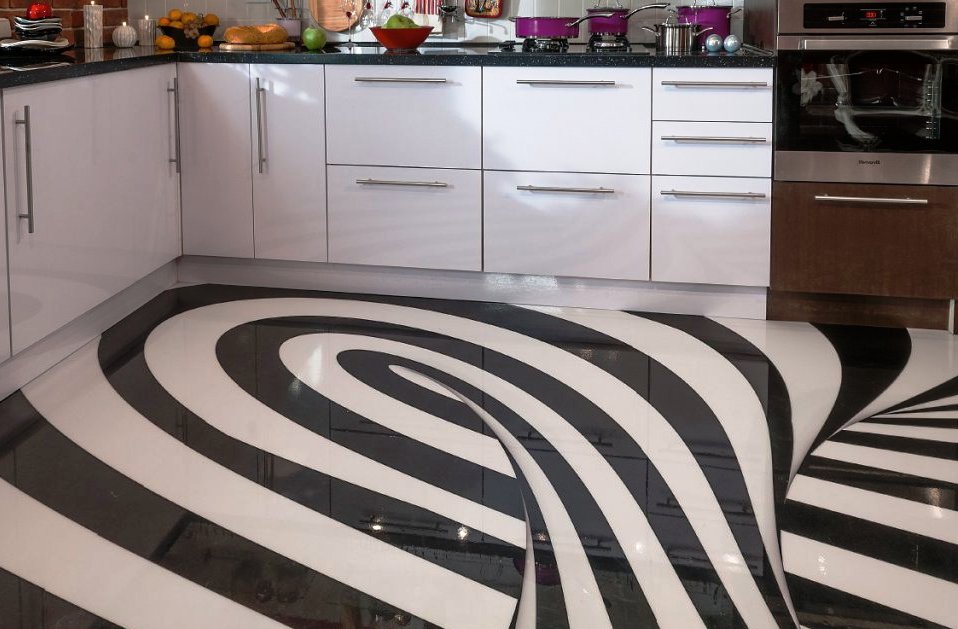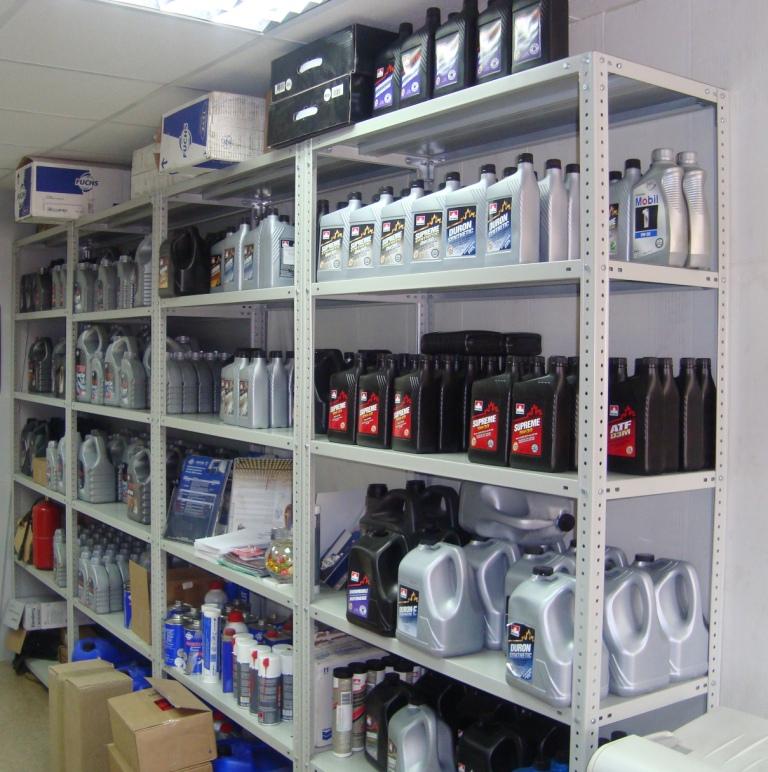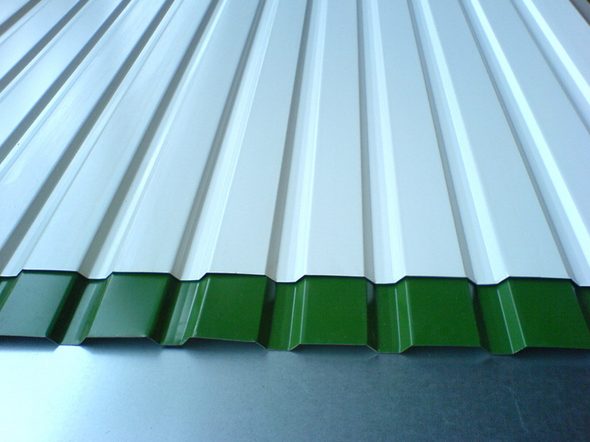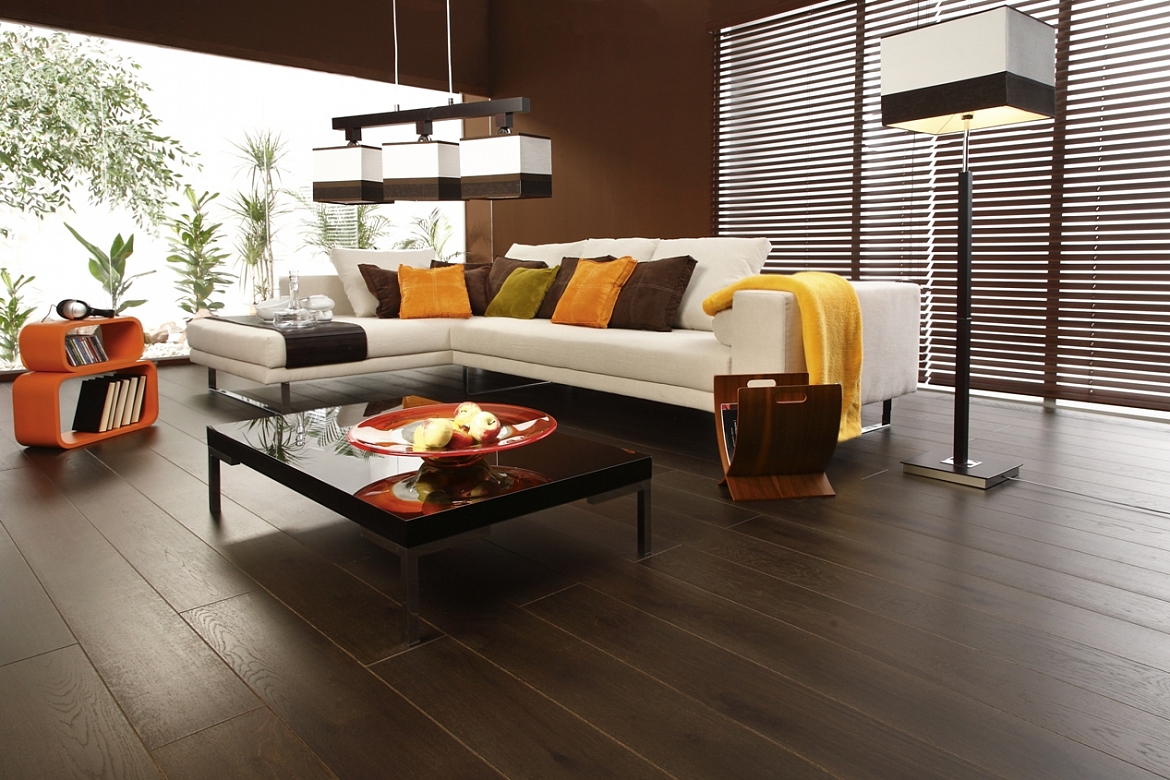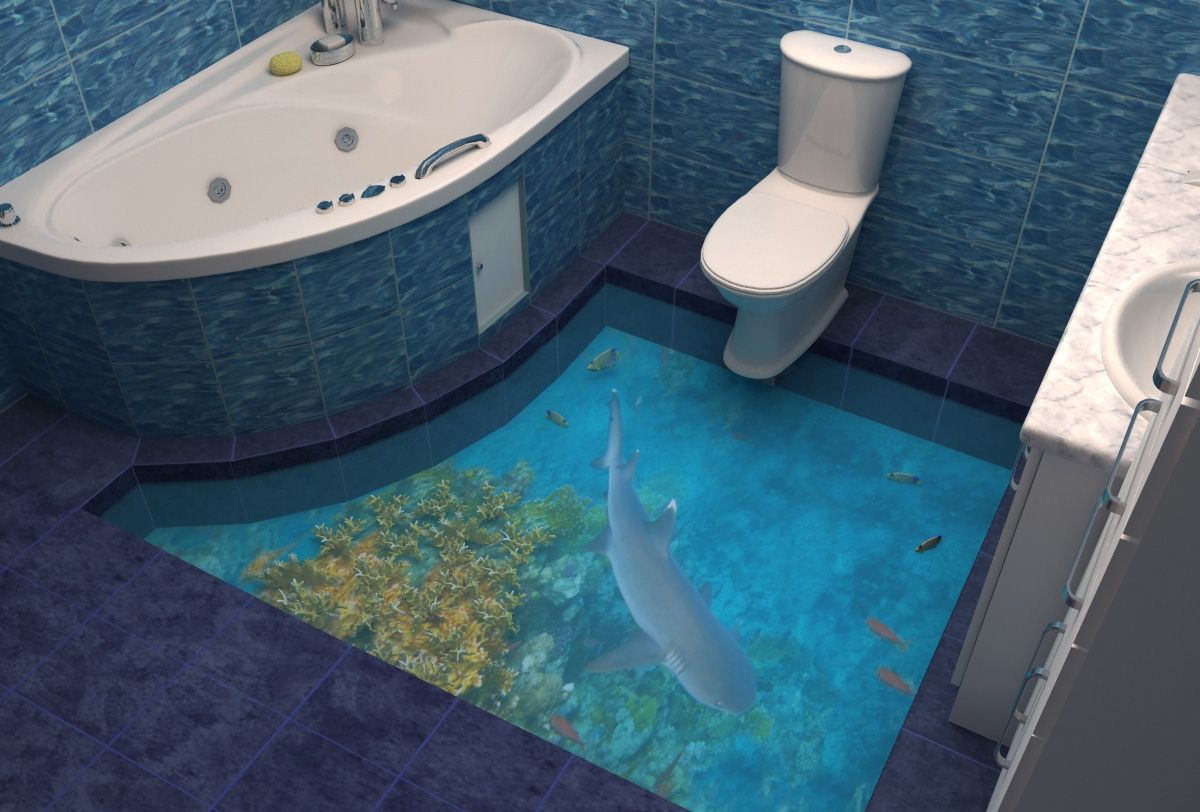Tiles for garage on the floor: 7 tips for choosing
If you are interested in options garage flooring, that means that with a high degree of probability you are a car owner, and if so, then it’s not for us to tell you how important it is to organize a reliable parking place for your car. The garage often plays the role of not only "home" for the car, but also serves as a workshop, i.e. flooring will be significantly affected. This is the weight of the car, and moisture with dirt brought inside on wheels and a body, spilled gasoline with oil or a washer, and shock loads from the fall of a heavy tool. The floor should be such as to withstand all these influences, while maintaining a decent appearance for as long as possible. One of the most suitable options is tile. Let's figure out together which tile for a garage on the floor is best suited.
No. 1. What should be the tile for the garage?
Naturally, an ordinary tile, which is used for arrangement kitchens and bathrooms, it’s just not suitable for a garage due to its fragility and insufficient strength. Here you need a more reliable material that will meet the following requirements:
- resistance to mechanical stress. A heavy car will drive in the same place for a long time, while the floor covering should not be deformed and cracked. The floor must maintain integrity even when a heavy tool falls, one way or another connected with car repair, therefore, the usual ceramic tileused in the repair of an apartment is definitely not suitable;
- moisture resistance. Rainy and snowy weather in our country is not uncommon. A car, driving from the street, brings with it a sufficient amount of moisture, which can adversely affect the floor covering. Some garages suggest the possibility of washing a car, i.e. humidity will often be elevated. The floor finish must have a minimum of pores and low absorbency in order to survive in such conditions;
- resistance to aggressive chemicals. A garage is a place where substances such as gasoline, diesel fuel, car oil, antifreeze and other car care products and household chemicals are constantly stored and used. If something accidentally spills onto the floor (and sooner or later something necessarily spills), the coating should not be damaged. Wood, for example, easily absorbs spills, which will damage its appearance and many performance characteristics. Some types of tiles are also characterized by increased porosity, therefore they are completely unsuitable for use in a garage;
- resistance to low temperatures. Garages are usually not are heated, because in winter the temperature there will be almost the same as on the street. If the flooring is porous, then the accumulated moisture, turning into ice, will destroy the material, i.e. again, some types of tiles are definitely not suitable;
- fire safety. To the room where gasoline, diesel fuel and other flammable liquids are stored, special requirements are put forward. As for the flooring, it should not ignite and not support combustion;
- easy care. There should be no problems, since almost any tile is easy to clean and wash. Difficulties can arise only with an overly embossed coating, which is chosen, wanting to organize the most non-slip floor;
- aesthetic qualities Covers for most car owners go by the wayside. The garage should be neat, and an unusual design is best left for the apartment;
- cost. High-quality coverage is not cheap - it’s worth accepting it and not trying to save too much, but there are still more and less expensive materials, so everyone can make a choice on their own budget.

Against the background of other floor coverings used to equip the garage, tiles seem almost the most ideal option. Concrete floor dusting and needs constant sweeping, wooden easily absorbs liquids and is afraid of fire, and suitable in all respects bulk is too expensive.
All, or almost all, of the requirements listed above correspond to several types of tiles. Let us dwell on the properties and features of each of them.
No. 2. Paving slabs
Paving tiles You can lay out not only the site in front of the house and garden pathsbut also the floor in the garage. This is a fairly budgetary and practical option. The most widely used concrete tile. It is made of concrete mix, which forms are filled with. They are placed on a vibrating table, where the process of compaction of the future tile takes place (vibration casting method). Additionally, a press can be used, which can significantly reduce the compaction time (vibrocompression method). Due to the presence of special additives in the concrete mixture, the finished material is resistant to moisture.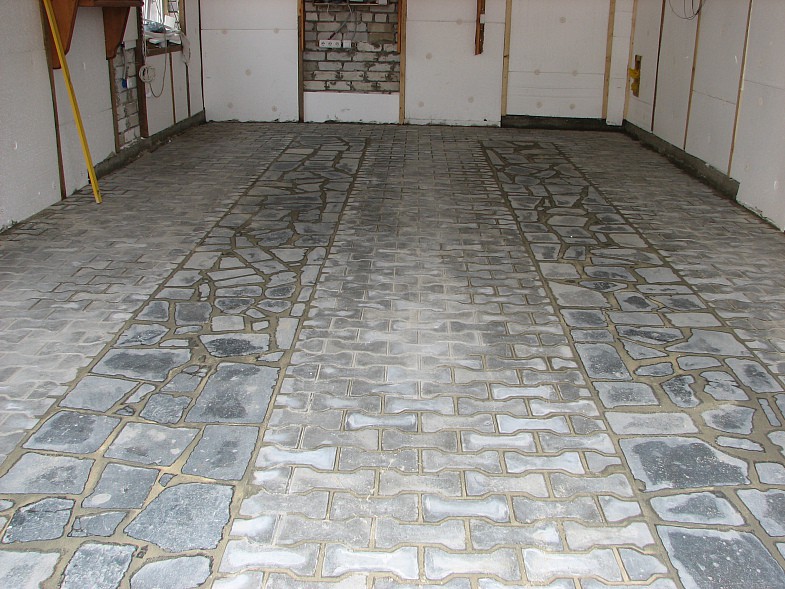
The main advantages:
- high resistance to mechanical stress, which is provided by a significant thickness of the products;
- wear resistance;
- low level of slip, which is important for a room on the floor of which water and other liquids will often fall;
- durability;
- huge assortment. The garage can be decorated with ordinary gray rectangular tiles, as well as colored curly, creating an interesting pattern;
- simple styling;
- low cost, and given the combination of price and quality, paving slabs can be considered almost the most optimal option for flooring for a garage.

Disadvantage only one:
- the material is hygroscopic, therefore it can absorb moisture. Of course, the level of hygroscopicity is not as furious as that of wood, but not so low as that of porcelain stoneware. Manufacturers are trying to create an increasingly moisture resistant tile, but it is impossible to completely get rid of porosity. This means that it is better not to use paving slabs if the garage is not heated and is located in a region with a cold climate. Also, paving slabs are not suitable for garages with a constantly high level of humidity. In addition, hygroscopicity will complicate the cleaning process.
Some types of tiles are expensive. If the budget is limited, then there is no point in wasting money on the most expensive tile, but it is also better not to take very cheap material, since it can be made at a handicraft industry without observing all the rules, and then there is no need to talk about any of the advantages listed above.
No. 3. Brick tile
Brick tile meets all the requirements for flooring in the garage, and could be considered an ideal option, if not for its relatively high cost. Material is obtained from refractory clay varieties, mainly shale clay is used. For glazing, glass chips are added to the raw materials. The temperature in the melting furnaces reaches 1200-13000C, due to which the previously well-pressed raw materials are sintered so well that all pores and voids disappear - it is possible to obtain a monolithic product. It is thanks to this technology that the unique properties of clinker tiles are achieved.
Benefits:
- almost zero water absorption, because rainy weather, spilled liquids and frosts do not matter to the material;
- a high level of resistance to mechanical stress and abrasion, and when heavy objects fall, the appearance of chips is unlikely;
- resistance to chemicals;
- resistance to fire. If you recall the temperatures at which the material is made, it is easy to guess that the clinker is not afraid of fire. At temperatures up to 18000C there are no deformations or fractures;
- longevity, measured in decades;
- simplicity in leaving. No dirt accumulates in the dense tile structure without pores, and all spilled liquids will be very easy to eliminate.
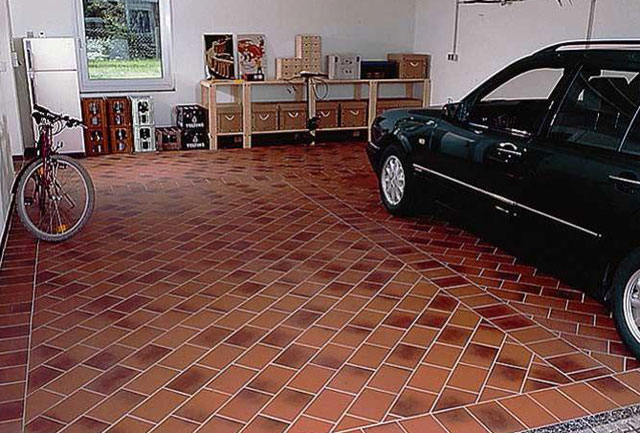 Without cons, alas, it was not enough:
Without cons, alas, it was not enough:
- price. You have to pay for high-quality reliable coverage, but this can be considered an investment in the future, devoid of problems with the repair of flooring in the garage;
- complexity of installation. Minimum porosity complicates the process of choosing the adhesive composition for laying tiles. You will have to carefully approach the choice of glue, and it will cost a lot;
- a small range of colors and shapes could be considered a disadvantage in the arrangement living room floor or when choosing material for the site in front of the house, but when it comes to the garage, performance is paramount. It is enough that the clinker tile looks nice and on its basis you can create a neat, discreet and, most importantly, durable coating.
If the budget allows, then feel free to opt for clinker tiles - it will faithfully serve many years in a row. If finances are limited, then other options will have to be considered.
Number 4. Porcelain Tiles
Porcelain Tiles Ideal for use in a garage. It is possible to attribute the material to the tile only with a stretch, since porcelain stoneware approaches the natural stone in properties, and even surpasses it in some characteristics. They make it on the basis of clay, sand, mica, feldspar and granite chips. All components are mixed, pressed at high pressure and fired in an oven at a temperature of 1200-13000C. The result is a material that is almost completely devoid of pores (like clinker tiles). The unique composition allows you to achieve record strength: tiles with a thickness of 3 mm can withstand loads of up to 200 kg / cm2. It is not surprising that porcelain tile is considered almost the most suitable material for a garage.
Benefits:
- high strength and wear resistance. The material can easily withstand the load of a car constantly passing through the same place, and the fall of a heavy tool will not become fatal for it;
- almost complete absence of moisture absorption, because precipitation, car washing, spilled liquids are not terrible for porcelain stoneware;
- frost resistance. Due to the absence of pores, porcelain stoneware easily withstands low temperatures and temperature differences, while maintaining integrity;
- simplicity in leaving. No pores - no dirt in them, therefore it will be very simple to maintain cleanliness;
- resistance to chemicals;
- fire safety;
- durability;
- a wide variety and the ability to create an aesthetic coating for every taste.

there is minuses and porcelain stoneware:
- high price;
- difficulties in transportation due to the large weight and fragility of the material;
- installation difficulties due to low porosity and poor adhesion resulting from it adhesive compounds, therefore, the choice of glue should be approached with extreme caution. In addition, porcelain stoneware is poorly cut, which further complicates the laying;
- low thermal insulation qualities.
The range of porcelain stoneware is impressive, but for a garage it is better to take material with a matte surface - glazed specimens look nice, but scratches will quickly appear on the surface in the garage and the coating will look messy.
No. 5. Rubber tile
Rubber tile inferior in popularity to other types of tiles, but in terms of the combination of operational qualities, it is excellent for use in a garage. They produce material based on rubber-rubber crumb with the addition of dyes and modifiers.Rubber tiles are used to equip industrial premises, and recently began to be used to organize flooring in the garage.
Benefits:
- excellent resistance to mechanical and shock loads. Even a heavy tool, falling, will not split the coating, and the car will not leave any damage on it;
- high level of moisture resistance. Rubber tiles are an ideal solution for a garage where you will need to periodically wash the car. She is not afraid of frost and temperature extremes;
- ease of installation. Separate tiles are connected to each other thanks to special grooves;
- good soundproofing qualities - if a heavy instrument falls on the floor, the noise will be negligible. Such a rumble, as when falling onto clinker tiles or porcelain tiles, will definitely not be;
- non-slip surface. Even if there is a puddle of water on the floor, it will be difficult to slip, and this is very important from a safety point of view;
- simplicity in leaving;
- A wide selection of shapes, colors and sizes.

Among cons note:
- rubber tile is relatively flammable and burns. For the garage, you need to take those products that contain substances that impede combustion;
- price. Rubber tile is not the most expensive, but not the cheapest coating;
- instability to certain chemicals;
- Although the process of installing tiles is relatively simple, but for the coating you need to prepare a perfectly smooth and durable base.
No. 6. Acid resistant tile
It makes sense to use this material if the garage is not only a car parking lot, but also a space where various kinds of repair processes often and actively occur. Tiles are made from refractory grades of clay with the addition of substances that increase the resistance of the material to various kinds of negative influences.
Pros:
- wear resistance and strength, resistance to mechanical loads. If the material can withstand the weight of the factory machines and their vibration, then it can easily withstand the weight of the car;
- the material practically does not absorb moisture;
- resistance to aggressive substances;
- frost resistance and resistance to temperature extremes due to low porosity;
- easy care, because the non-porous surface of the tile does not absorb dirt and grease.
Minuses:
- unpretentious design and a small assortment;
- difficulties in choosing an adhesive composition.

Number 7. Features of installing tiles in the garage
Installing tiles in a garage is practically no different from installing it in any other room. The basis may serve:
- sand;
- concrete.
If the garage is selected strip foundation, it’s easiest to lay the tile on a dirt base. Work begins with excavation. It should be a hole below the gate. It is covered with a layer of crushed stone and sand of 10 cm, and if a truck is in the garage, it is better to provide a layer of 20 cm. This base must be moistened and tamped. With a high level of groundwater, it is necessary to waterproof with a roofing material. The tile is mounted on a dry mixture of cement and sand 1: 4 with a thickness of about 5 cm. The joints are filled with the same mixture of sand and cement. The final touch - watering the floor with water to harden the mixture.
It is even easier to work with a concrete base. It is enough to thoroughly clean it from debris, process it primer. The tile is mounted on a mixture of sand and cement or on glue. Please note that the adhesive must be frost-resistant and appropriate to the type of tile chosen.
If the concrete floor is initially not very smooth, then you must perform screedwhile not forgetting to organize a slight bias towards the gate for the outflow of fluid. If the climate in the region is severe, then under the floor you can lay heating cableTrue, this event will cost a lot.
Tile installation is customary to start from the gate or from a viewing hole, if any. First, whole elements are laid, as in the back of the garage, cut tiles will be less noticeable.
To obtain the highest quality result, you must adhere to the following rules:
- There should be no voids under the tile, otherwise the tile may crack under the weight of the car. Therefore, the base should be as even as possible, and the bonding layer should be uniform and small in thickness.
- For unheated garages choose an adhesive that is resistant to frost.
- For the installation of clinker tiles and porcelain tiles, special compositions are chosen due to the low adhesion of these materials.
The tiled floor is ready for use after 1-2 weeks.

